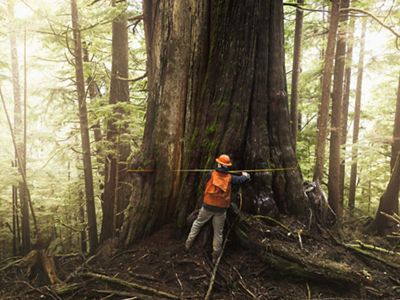Media Contacts
-
Jacqueline Nunes
Phone: +1 437-291-3287
Email: jacqueline.nunes@natureunited.ca
Nature United applauds recent steps taken by the BC government to improve forest policy—including integrating Natural Climate Solutions such as old growth protections—and their commitments to design conservation finance models that will move the Province towards its dual biodiversity and climate goals.
These advancements put a strong focus on forest health and climate change mitigation, protecting biodiversity and supporting community values. Most importantly, these advancements promote Indigenous leadership in the design and implementation of new policies and approaches to resource management across the Province as committed to in the Declaration on the Rights of Indigenous Peoples Act.
Quote: Michael Reid
We must work together to transition towards forest management approaches that prioritize ecosystem health and center Indigenous peoples in decision-making processes.
“Nature United commends these recent commitments made by the Province as important milestones on the journey towards realizing vibrant and sustainable forests,” says Michael Reid, Nature United’s British Columbia Program Director. “We must work together to transition towards forest management approaches that prioritize ecosystem health and center Indigenous peoples in decision-making processes.”
“This transition needs to happen on a timeline that reflects the scale and urgency of the climate and biodiversity crises while also respecting local livelihoods and economies.”

People across BC deeply care about the health of forests and marine ecosystems and understand that their communities thrive when these ecosystems thrive. At Nature United, we are also deeply committed to creating more resilient ecosystems and communities, which is why we are recognizing several of the BC government’s recent initiatives, including:
$180-million investment to support innovation and transitions in the forest sector and $25-million investment in new forest planning tables to improve old-growth and forest management decision-making. This will accelerate implementation of the Old Growth Strategic Review, and more broadly signals a paradigm shift in the forest sector. These and related measures will improve biodiversity and overall ecosystem health in BC’s forests;
New and innovative approaches to finance nature conservation, which brings much needed resources from various sectors;
Enabling First Nations and others to pursue carbon finance projects developed under the forthcoming Forest Carbon Offset Protocol, as a means of realizing forest conservation and improved forest management, ultimately supporting the protection of biodiverse areas, and
Increasing Indigenous participation in changes to forest policy.
Shifting the forest management paradigm to one that is grounded in ecosystem health, reconciliation and prosperous local communities is crucial in BC, as it is across Canada. In particular, increasing investments in improving old growth management and conservation, while centering Indigenous peoples in the decision making related to forestry and resource use within their territories, are key to making this shift a lasting and beneficial reality.
These policy changes were accompanied by other recent actions carried out by the Province to protect nature and local livelihoods while tackling the climate and biodiversity crises. In particular, to protect BC’s extraordinary coasts and marine ecosystems for generations to come, 15 BC First Nations, the Province of BC and the Government of Canada, with support from Nature United, recently unveiled a blueprint for a network of marine protected areas across the Great Bear Sea. That agreement will ramp up the protection of globally rare and productive ecosystems. It will also support the resilience of coastal Indigenous and non-Indigenous communities, while advancing the Province’s recent commitment to protect 30% of lands and waters by 2030, aligned with national and international biodiversity goals
These and other initiatives are putting BC on a clear path to a future where both people and nature can thrive. Nature United encourages the government to implement these policies through strategic investment and collaborative decision-making. We remain committed to supporting the Province and First Nations in this crucial work for the people of BC and all its natural assets.
Nature United also looks forward to working with the Province, First Nations, and the forest sector to advance additional policies and other solutions that uphold Indigenous rights and authority in conservation, and that realize the environmental, social, and economic benefits available from Natural Climate Solutions for people across BC, Canada and the world.
Nature United was founded as a Canadian charity in 2014, building on decades of conservation in Canada. Headquartered in Toronto, our organization has field staff located across the country. Nature United supports Indigenous leadership, sustainable economic development and science and large-scale conservation, primarily in British Columbia, the Northwest Territories and Manitoba. Our organization is also working to accelerate Natural Climate Solutions at national and regional scales. To learn more, visit natureunited.ca or follow us on Linkedin, Instagram and Facebook.
We are the Canadian affiliate of The Nature Conservancy, a global conservation organization with more than a million members and a diverse team that includes more than 400 scientists. Our global organization works in more than 80 countries and territories — either directly or through partnerships — to conserve the lands and waters on which all life depends. To learn more, visit www.nature.org or follow @nature_press.
